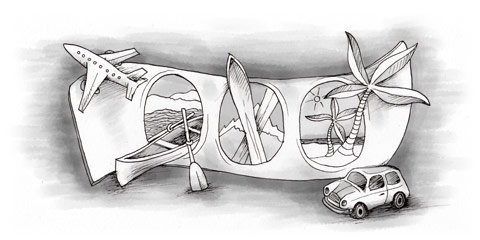Salmon are found in streams and rivers in the Cantabrian range and in Galicia, and trout are common in the upper reaches of rivers throughout Spain. Sea fishing is very popular, particularly among locals, and you can fish without a licence from the shore (but note that fishing isn’t allowed from many beaches) or rent a boat and go out to sea.
Common saltwater fish include grouper, sea bream, mackerel, cod, tuna, mullet, bonito, swordfish and various species of shark, although sea fishing is declining in popularity, as Spanish waters are largely ‘fished out’ (particularly the Mediterranean). The Canaries are in the great fishing grounds of the Atlantic, where some of deep-sea fishermen’s largest catches, e.g. marlins, tuna and sharks, are found in abundance. Deep-sea fishing trips are also available and organised from most mainland Spanish ports, and competitions are held regularly.
Freshwater fishing requires a licence ( licencia de pesca), valid for one, three or five years and issued by regional governments. Licences are available from various organisations such as town halls, savings banks and regional offices, and some regional governments issue them online. You need to present proof of identity and evidence of civil liability insurance (in some regions only, e.g. Andalusia) and pay the fee. In many regions, fishing licences are free for the over 65s.
The website Su Licencia processes licence applications online for the regions of Aragon, Asturias, Castile & Leon, Castile-La Mancha, Catalonia, Extremadura and Navarre. Penalties for fishing without a licence are high and if you’re caught you will probably also have your rods confiscated.
Fishing seasons in Spain
The fishing season varies depending on the particular species of fish, e.g. the trout season starts in March and the salmon season commences on the first Sunday in March. The salmon season closes on the second Sunday in July and the trout season at the end of August or September. On most rivers there are restrictions on the number of licences issued each day and on the size of fish (and often the number) that may be caught, and the bait and technique that can be employed.
Information about local fishing areas and fishing permits is available from local town halls and tourist offices. Tourist offices may also provide a fishing map ( Mapa de Pesca Fluvial) showing where to fish and what you may catch, plus details of seasons and licences.
Sea fishing is also popular and you can fish without a licence from anywhere along Spain’s coastline or rent a boat and go out to sea. Many Spaniards fish from beaches in winter. Boat rental, perhaps with a local fisherman as a guide, and deep-sea fishing trips can be arranged throughout Spain. Sea fishing is prohibited from one hour after sunset until one hour before dawn and deep-sea fishermen need a licence from the provincial Comandancias de Marina. There are numerous regional and local fishing clubs throughout Spain. Two useful books in English for fishermen are Angling in Spain and Flyfishing in Spain by Phil Pembroke (Philip Pembroke).
This article is an extract from Living and Working in Spain.
Click here to get a copy now.




